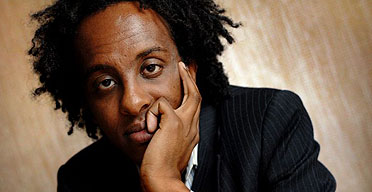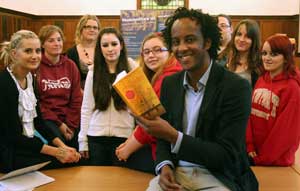The Beautiful Things That Heaven Bears (2007)
Dinaw Mengestu

Credits
America's cherished immigrant narrative — that triumphal tale of striving and assimilation, of quaint old-world traditions giving way to the enticements of the new — gets a melancholy revision in Dinaw Mengestu's understated first novel, The Beautiful Things That Heaven Bears. ''I did not come to America to find a better life,'' says narrator Sepha Stephanos. ''I came here running and screaming with the ghosts of an old one firmly attached to my back. My goal since then has always been a simple one: to persist unnoticed through the days, to do no more harm.''
Stephanos has succeeded all too well. In the 17 years since he fled the political violence in his native Ethiopia, Stephanos has acquired a shabby grocery store in the predominantly black Washington, D.C., neighborhood of Logan Circle, which he chose because it reminded him ''that wealth and power were not immutable, and America was not always so great after all.'' He sells Bubble Tape gum and potato chips to schoolchildren and prostitutes (whose wares he sometimes accepts in trade) while reading V.S. Naipaul behind the counter. He is one of those emotionally frozen characters whom fiction writers love trying to thaw.
And who better to awaken this benumbed man than a woman? White urban pioneers begin to settle in the neighborhood, angering longtime residents and upsetting Stephanos' equilibrium. Among the arrivals is Judith, a seductive white academic who buys and refurbishes ''a beautiful, tragic wreck of a building,'' and moves in with her precocious mixed-race daughter, Naomi.
With blithe self-assurance that is possibly even more enviable than her wealth, Judith strikes up a friendship with Stephanos. Less probably, so does Naomi, who is soon spending whole days in his shop reading and discussing Dostoyevsky. (Happy though this makes Stephanos, the relationship rings false, the kind of precious intergenerational rapport that turns up most often in movies.) Hesitantly, Stephanos begins to imagine a fuller life, one that could perhaps include a romance with Judith.
How both Logan Circle and Stephanos ultimately deal with the threat/promise of Judith is the substance of this graceful novel. If there's an underlying problem with the work, it's that Mengestu keeps such tight control over his material that it can't really breathe. Judith and Stephanos play their roles with subtlety and intelligence, but they always feel like just that: roles. The warmth that you sense lurks inside these people and within this impeccable book never completely emerges because Mengestu, like his characters, seems to be following a script. B+
Ethiopian-American wins Guardian First Book Award
- guardian.co.uk, Wednesday 5 December 2007 19.30 GMT
- Article history

No authorial vanity: Dinaw Mengestu. Photograph: Linda Nylind
A novel that tackles fraught questions of identity, dislocation and loneliness through the life of an Ethiopian émigré in the US has taken this year's Guardian First Book Award.
Dinaw Mengestu's Children of the Revolution tells the story of Sepha Stephanos, a man who fled to America to escape the violence of Ethiopia's communist revolution after witnessing his father's death at the hands of junta soldiers. Seventeen years later, running a struggling convenience store in a once grand but now dilapidated neighbourhood of Washington DC, Stephanos is still trying to find his place in the new world.
Reviewers have been quick to point out the parallels between Stephanos's life and Mengestu's own. Born in Addis Ababa in 1978, Mengestu was just two years old when he and his mother and sister followed his father - who had been forced out by the revolution two years earlier - to the US. From there, however, their lives diverge: where Stephanos is trapped by his immigrant status, Mengestu attended Georgetown University and graduated from Columbia University's MFA program. His clean, spare sentences and ability to deal with tragedy in a controlled and meticulous way won the judges' unanimous praise.
The Guardian First Book Award, worth £10,000 to the winning author, is unique among literary prizes in that it is open to all debut writers regardless of genre. Previous winners have included Zadie Smith and Jonathan Safran Foer. Children of the Revolution was joined on this year's shortlist by two other novels (Tahmima Anam's A Golden Age and Catherine O'Flynn's What Was Lost), Rosemary Hill's biography of the architect Augustus Pugin, God's Architect, and Rajiv Chandrasekaran's account of the lurid blunders of America in Iraq, Imperial Life in the Emerald City.
Speaking after the award was presented at a ceremony in central London last night, the Guardian's literary editor and chair of the judging panel Claire Armitstead said that while each of the shortlisted books had their champions, the economy and power with which Mengestu depicted the dead-end lives of his characters saw him emerge as the winner. "Unusually for a first novel, there is no slack in his writing, no authorial vanity to interfere with his evocation of immigrant life in 21st-century America," she said.
In addition to the Waterstone's reading groups, represented on the panel by Stuart Broom, Armitstead was joined in the judging by the presenter Mariella Frostrup, journalist and author Simon Jenkins, Phillippe Sands, QC, the Guardian's features editor, Katharine Viner, and the novelists Maggie O'Farrell and Kamila Shamsie. As well as applauding the novel's "beautiful writing", Shamsie praised the "many different layers of loss in the book, from the brutal to the barely-glimmering". It is, she said, "a book of quiet and haunting power, impossible to shake off long after you've turned the last page."
Mengestu, who is currently living in Paris and writing a second novel set in a small town in the American midwest, accepted the award with visible delight. "It's amazing," he said. "I'm still stunned".
Dylan Thomas Prize Writer’s Words inspire Students
7/11/2008
Printer Friendly Page A young writer who is competing to win one of the world’s biggest literary prizes spent a day at Newport’s University spreading words of inspiration to creative writing students.
Dinaw Mengistu, one of the six finalists in the running for the second £60,000 Dylan Thomas Prize, led a workshop on how to create characters in fiction before giving a reading from his prize-winning novel ‘Children of the Revolution’.
“Dinaw’s workshop which explained how to create more depth in our characters was really interesting and helpful,” said student John Williams, from Bridgend, who is currently working on a novel.
Linda Ruhemann, Programme Leader on the Creative Writingdegree course at the University’s School of Education, said, “It was fantastic to welcome Dinaw, who is undoubtedly one of the world’s up-and-coming literary stars, to our university and I hope he has enjoyed interacting with our students as much as they have with him. It’s very inspiring for these young people, some of whom are heading towards a career in writing themselves, to see someone who is not much older than they are making real waves in the literary world.
“The University has hosted many well-known writers over the years, including Les Murray, Gillian Clarke, Wendy Cope, Liz Lochhead, Gwyneth Lewis, among others and now we have yet another great name to add to this list. On behalf of myself, the staff and the students here at the University of Wales, Newport, we wish Dinaw the best of luck at the awards ceremony next week.”
Dinaw, who was born in Ethiopia in 1978 and is a graduate of Georgetown and Columbia Universities, works as a journalist and reviewer and is researching a book tracing his extended family’s exile from Ethiopia following the 1974 revolution.
Dinaw and the other finalists in competition have spent the last week encouraging others to become writers by visiting institutions across Wales in a programme arranged by the University of Wales, which sponsors the award.

RIGHT: Dinaw Mengistu, one of the six finalists in the running for the second £60,000 Dylan Thomas Prize, chats to Creative Writing students Nuala Sutton, John Williams and Serah Pipe during his workshop and reading at Newport’s University.
The winner of the Dylan Thomas award, inspired by the Swansea-born poet whose first book of poetry was published when he was just 21, will be revealed on Monday.
Paul Newman, chief executive of the prize, said, "The Dylan Thomas prize is not just a lump sum for a writer, it is an initiative to support, encourage and inspire young writers across the world.” He added that as the prize develops they will be able to bring the educational programme to a much larger audience.
For information about Creative Writing and all other courses at the University of Wales, Newport contact the University Information Centre on

